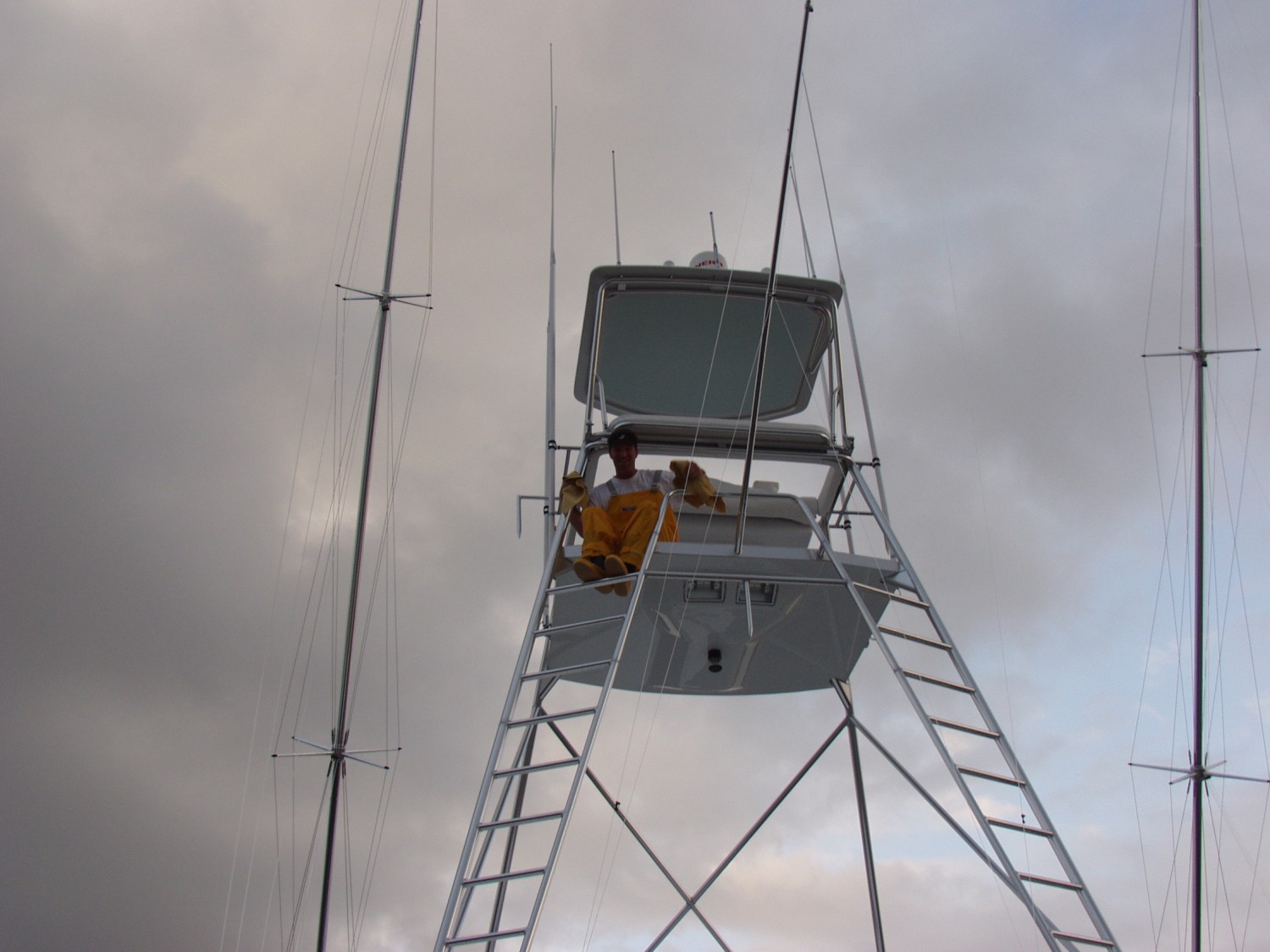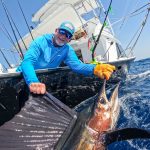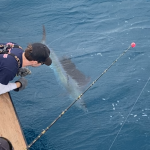Article Courtesy: inthebite.com | Originally Published: 12/16/20 | Author: Dale Wills | Click here for original article
Learning the Ropes: Passing Knowledge Down to the Next Generation
Most of today’s captains earned their shot at the helm only after spending years working under the watchful eyes of veteran skippers. Each of those mentors had certain techniques and practices that were passed down to the younger generation, things that formed the foundation of their careers as professional mariners. So what are some of the individual practices, habits and distinctions that are being passed down by the veteran captains today to the future captains of tomorrow?
Captain Rob Moore of the Fa-La-Me has over 25 years of experience and has been on a traveling schedule putting over 2,000 hours on his engines in two years. Moore uses a basic approach to managing the boat, one that he learned long ago. Wax something every day, organize something every day, do some preventive maintenance every day and work on something in the engine room every day, he says.
Another good routine to help prioritize and organize projects is to keep a pen and paper handy while fishing during the day. Captain Billy Borer always had a pen and pad at the helm and it’s something I learned from him, Moore says. You can be trolling along and the boss will say something like, ‘The second drawer on my dresser is stuck.’ I will write it down in my notes right then. You can easily forget about something little like that when the next thing you know, a blue marlin is piling on a teaser and everyone has forgotten about the dresser drawer. It’s just a good way to stay organized and detail-oriented.
Captain Rusty Nixdorf is a veteran captain with over 30 years of experience. One of the things I learned years ago, and I don’t think too many captains practice it today, is to always check my gears before I pull into a marina, he says. You never know when something can go wrong. Another operating procedure I use is slowly going up to cruising speed and slowly decreasing speed when I’m moving. Today, too many captains just run it up hard and pull it back hard–I was always taught to do it slowly. Your transmissions (and your mechanics) will thank you later.
Captain Kevin Deerman from Galveston, Texas has been a professional sportfishing mate and captain for more than two decades and has had the privilege of working with a few great skippers and mentors along the way, including Capt. Todd Habib and Mike Butler on the Alacran. When asked about what he still does today from lessons he learned years ago, he says, make sure that the owner, their family and their friends always enjoy the boat no matter what we are doing. Fishing is the easiest part of the job! Also, try to help other crews and owners when you can because you may need a hand in the future. I learned to use the K.I.S.S. (keep it simple, stupid) principle as much as possible. Deerman also recommends that when taking a job, try very hard to make it work, jumping around to different boats does not look good on a resume.
Captain Scott Murie, another carreer captain, credits one of his mentors for showing him the ropes and opening the door to a successful sportfishing career: Capt. Harold Staples on the legendary Destin charter boat Silver Hook. Murie worked as a mate in his late teens for four seasons charter fishing with Staples. He taught me to use my senses, such as learning to drive the boat by feel and not electronics. He always said to feel the current, the wind, the waves and learn to drive with feel, Murie reports. Another thing he taught me was to use my senses to smell the air and what bait and fresh air smells like.
Captain Alan Fields began working as a deckhand before his 15th birthday and remained a deckhand for approximately 18 years under the watchful eye of charter boat skipper Capt. John Mumford, fishing out of Ocean City, Maryland. Fields, who chuckles when he says that he’s been fishing for close to 55 years, says, Mumford taught me the basics of working full-time on a boat. His number one rule, which I still practice today, is to treat guests with respect and professionalism.
Fields believes that you should always treat others the way you would like to be treated. He taught me the foundation of my career, things like bait rigging, boat maintenance, fish cleaning and boat handling, he adds. Mumford also taught me to pay attention to the little things, like handing the loop end of my dock lines to the person on the dock–leave any dock line adjustments to be made on the boat, never counting on a dock attendant to do it for you. I see mates relying on dock attendants all the time and it’s really important when traveling to do it yourself.
Captain Danny Hearn of the Blank Check explains that of all the previous captains he worked for, including guys like Terry Stansel and Jimmy Garner to name a couple, the one common lesson was that being a boat captain is not all about catching fish.
It’s mainly about having the owner and their guests enjoy the entire sportfishing and boating experience, he says. We as captains are entertainers and when the boss and their family and guests are onboard, their happiness is our priority. It’s their occasion to relax and have a good time. Hearn adds that you can’t always count on good fishing but you can always work hard to show them a good time.
Captain Dean Adler of the 72-foot American Custom Yachts Don Teo says, I would have to say that I did not go through the typical ranks to become a sportfishing captain. I arrived on the scene in the early 1980s from running dive boats in Key Largo. The commercial experience taught Adler the importance of boat handling, proper maintenance and dealing with people. It’s no fun being broken down at the dock with 40 divers on board waiting for their trip to start, he reports.
The owners and captains TJ and Jann Holub of the dive shop I worked for were instrumental in how I continue to do things today. When I first stepped on a sport fish, I already had my captain’s license. I worked for a broker doing sea trials and deliveries. Adler says that he was conducting a sea trial for a client from Peru and was asked if he wanted to be their captain. He took the job and remained with them for 15 years. I learned the fishing techniques as I went along. Now, in my current sportfishing job, my experiences at the dive shop have paid off, he says.
Captain Rich Barrett, of the 73-foot Bayliss Sharkbyte, explains that he worked as a mate for 15 years and credits Capt. Rich DeFeo, the original Tyson’s Pride captain, for showing him the ropes. Captain Defeo traveled extensively with the boat and in doing so the pair learned to be self-sufficient, especially in remote locales. These were valuable lessons, not only for my confidence but also in many ways it has saved my employers plenty of money, Barrett reports.
Not surprisingly, most of the experienced captains were taught early in their careers that the fish catching part of a private job is not the highest priority. Most would say that manager and entertainer is a better description for running a sportfishing operation today. As the next generation of captains take the wheel, it’s very important for the veterans to teach not only the basics of boat handling, maintenance and fishing knowledge but more importantly how to be a people person. It’s up to us to make the career of a professional captain a total and well-rounded package.
Taking Time to Teach
Many captains on the docks today have expressed roughly similar sentiments about the current crop of deckhands running around today’s cockpits: most of them know it all, and not in a good way. Today’s mates are learning fast but not necessarily right (and there’s a big difference).
Mostly gone are the days of being an apprentice and spending years in the cockpit literally under the watchful eyes of a veteran skipper, earning the chance to take the helm only after they have shown they deserve it. One captain mentioned that social media is producing a generation of, I know how to do it,
when they haven’t ever physically completed the task, for example. Online videos don’t count. Another made a comment that when traveling, he takes over the wheel from his mate when they reach cell phone range due to their constant texting and smartphone use. He feels uncomfortable knowing his mate could pay less attention as a result. A third captain said he was weary of teaching his mates everything he knows, only to see them move on to another boat and then compete against him in tournaments using his own tricks and tactics.
So what’s the answer? Take the time to clearly explain how things should be done your way, and correct bad habits through positive reinforcement. Avoid raising your voice to a mate and never belittle or embarrass them in front of charter parties or the owner, call them to the bridge instead and quietly explain what you want done, and more importantly, why. Today’s mates are the captains of tomorrow and it’s our responsibility to make sure they’re ready for the job.






